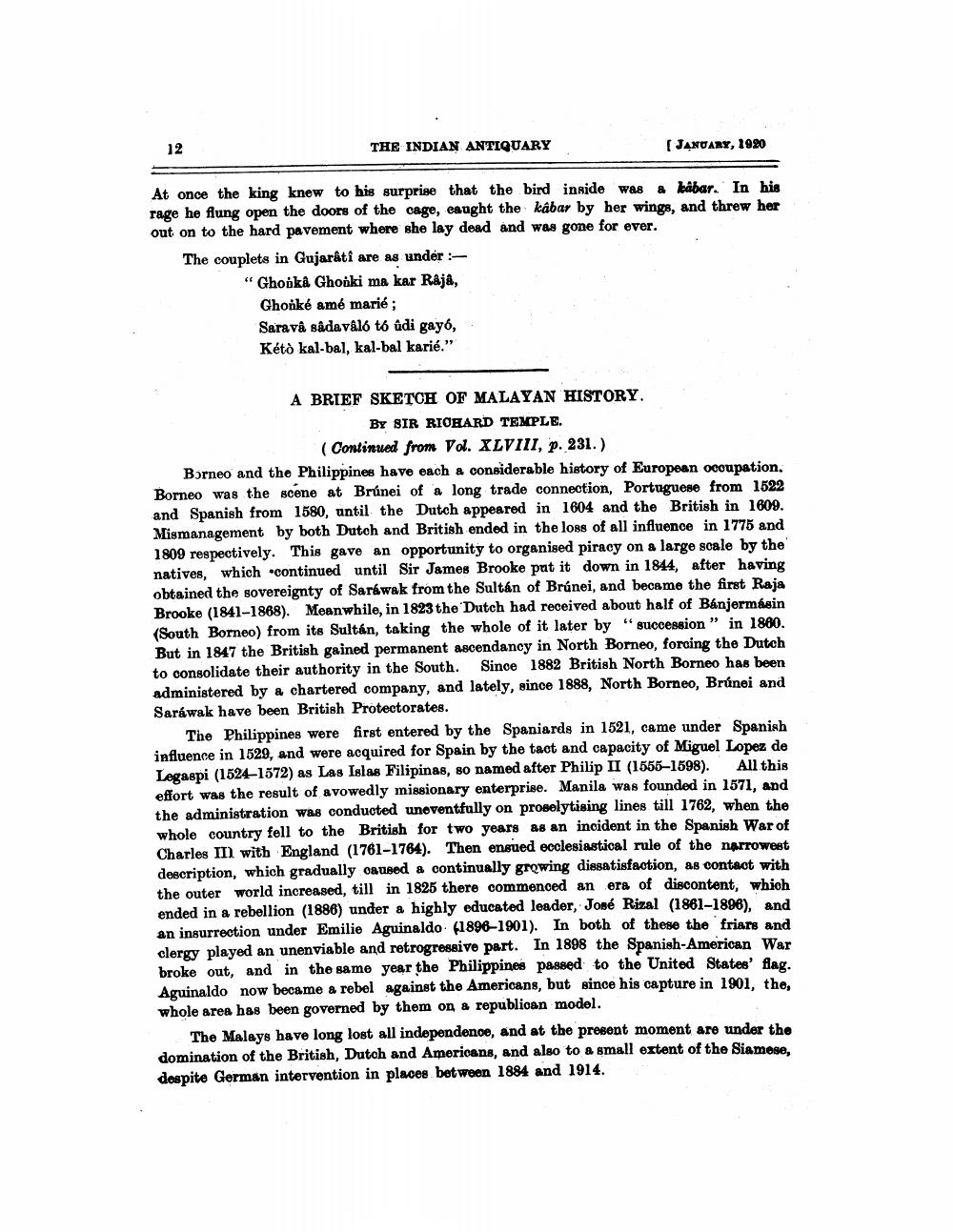________________
THE INDIAN ANTIQUARY
( JANUARY, 1920
At once the king know to his surprise that the bird inside was a bábar. In his rage he flung open the doors of the cage, caught the kabar by her wings, and threw her out on to the hard pavement where she lay dead and was gone for ever. The couplets in Gujarati are as under :
"Ghooka Ghonki ma kar Raja,
Ghonké amé marié; Sarava sâdaváló tó adi gayó, Kétò kal-bal, kal-bal karié."
A BRIEF SKETCH OF MALAYAN HISTORY
BY SIR RIORARD TEMPLE.
(Continued from Vd. XLVIII, p. 231. ) Borneo and the Philippines have each a considerable history of European occupation. Borneo was the scene at Brúnei of a long trade connection, Portuguese from 1522 and Spanish from 1580, until the Dutch appeared in 1604 and the British in 1609. Mismanagement by both Dutch and British ended in the loss of all influence in 1775 and 1809 respectively. This gave an opportunity to organised piracy on a large scale by the natives, which continued until Sir James Brooke pat it down in 1844, after having obtained the sovereignty of Sarawak from the Sultan of Brunei, and became the first Raja Brooke (1841-1868). Meanwhile, in 1823 the Dutch had received about half of Banjermásin (South Borneo) from its Sultán, taking the whole of it later by "succession ” in 1880. But in 1847 the British gained permanent ascendancy in North Borneo, forcing the Dutch to consolidate their authority in the South. Since 1882 British North Borneo has been administered by a chartered company, and lately, since 1888, North Borneo, Brúnei and Saráwak have been British Protectorates.
The Philippines were first entered by the Spaniards in 1521, came under Spanish influence in 1529, and were acquired for Spain by the tact and capacity of Miguel Lopez de Legaspi (1524–1572) as Las Islas Filipinas, 80 named after Philip II (1555-1598). All this effort was the result of avowedly missionary enterprise. Manila was founded in 1571, and the administration was conducted uneventfully on proselytising lines till 1762, when the whole country fell to the British for two years as an incident in the Spanish War of Charles II) with England (1761-1764). Then ensued ecclesiastical rule of the narrowest description, which gradually caused a continually growing dissatisfaction, as contact with the outer world increased, till in 1825 there commenced an era of discontent, which ended in a rebellion (1886) under a highly educated leader, José Rizal (1861-1896), and an insurrection under Emilie Aguinaldo (1896–1901). In both of these the friars and clergy played an unenviable and retrogressive part. In 1898 the Spanish-American War broke out, and in the same year the Philippines passed to the United States' flag. Aguinaldo now became a rebel against the Americans, but since his capture in 1901, the, whole area has been governed by them on a republioan model.
The Malays have long lost all independence, and at the present moment are under the domination of the British, Dutch and Americans, and also to a small extent of the Siamese, despite German intervention in places between 1884 and 1914.




